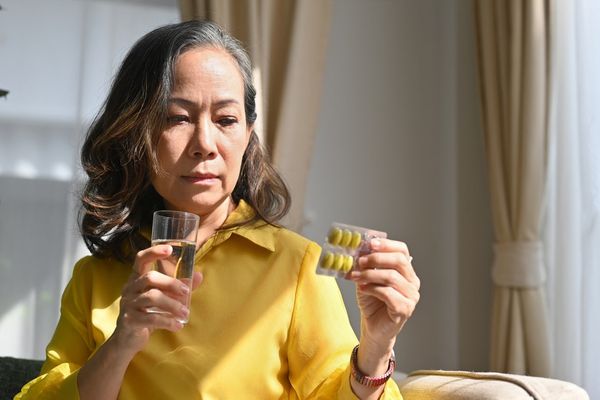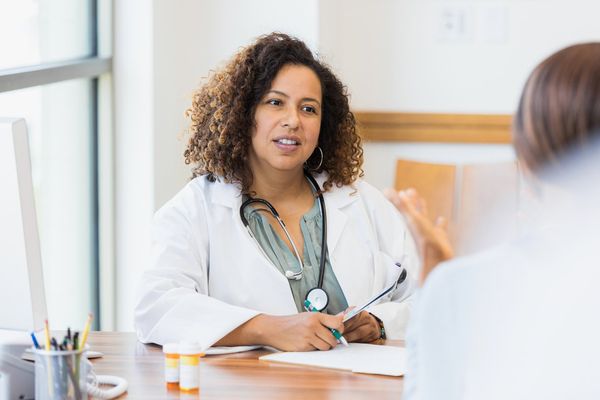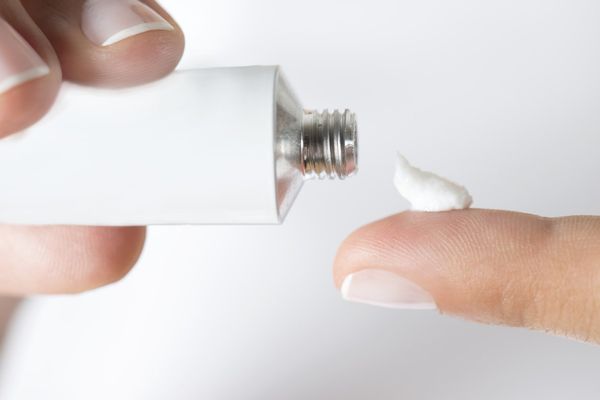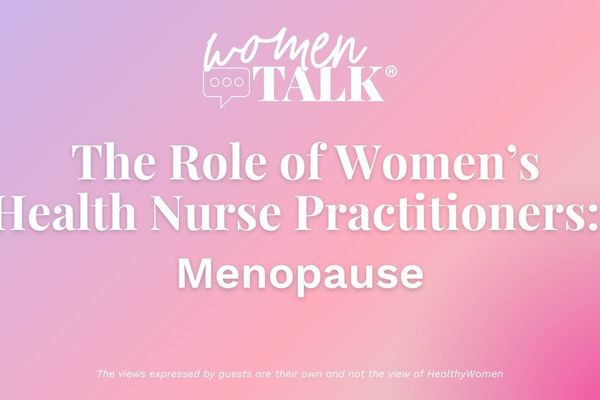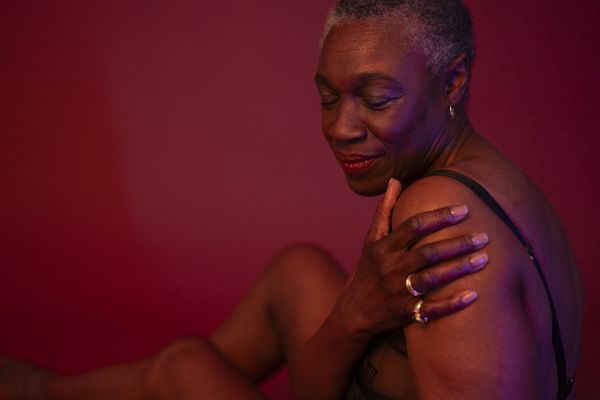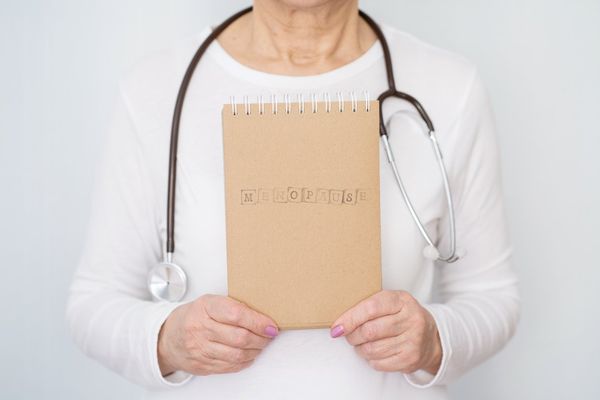You will likely reach the milestone of menopause during your 50s. The average age of menopause for U.S. women is 51, with most women reaching menopause somewhere between ages 45 and 55. You're considered "menopausal" when you haven't had a menstrual period for 12 consecutive months.
One of the first changes you're likely to notice if you've reached menopause is that you aren't having menstrual periods anymore. Or, if you're not quite there yet, periods may be few and far between. Hot flashes, one of the most common menopausal symptoms, may be making you uncomfortable. And you may notice that your skin is thinner and dryer now.
While sun exposure over the years is mostly responsible for changes in your skin's appearance—more wrinkles and brown spots, for example—declining estrogen levels can cause the lining of your vagina to be thinner and drier as well. That's why sexual activity for some women at this life stage can be uncomfortable or painful. Your skin care regimen should include moisturizing creams to prevent dry, flaky and sometimes itchy skin. Lubrication products and moisturizers can help with vaginal dryness, especially if sexual activity is painful.
Your health care provider may recommend vaginal estrogen as a safe option to combat vaginal dryness and sexual pain. It also helps keep the pH of the vagina normal to prevent bladder infections and vaginitis (caused by bacteria or yeast). Vaginal estrogen, available as creams, rings or tablets, does not increase the body's blood level of estrogen, so it doesn't have the same risks as the "whole body estrogen" in menopausal hormone therapy.
It's important to remember that each woman experiences menopause in her own way—while some don't seem bothered by symptoms, other women may feel miserable and overwhelmed by them. There are a wide variety of lifestyle changes and treatment options to help you manage menopausal symptoms, so don't give up!
You may want to ask your health care professional about menopausal hormone therapy, which can relieve both vaginal dryness and hot flashes. There are pros and cons to hormone replacement therapy. Some pros are stronger bones, better memory and concentration, better sleep and less colon cancer risk. Some of the more common risks are blood clots and stroke, hypertension and lipid changes. Hormone replacement therapy is usually only prescribed on a short-term basis (up to five years). Many women are candidates for hormone replacement therapy, but you would need to speak to your health care professional about your specific risks and benefits to tailor the most beneficial plan for you.
Women who aren't good candidates for hormones may try other medical options, as well as herbal remedies and lifestyle strategies to combat hot flashes and night sweats. Lifestyle options include:
- Dress in layers that may be removed if you find you're getting too warm.
- Sleep in a cool room.
- Drink plenty of water.
- Avoid hot foods such as soups, spicy foods, caffeinated foods and beverages and alcohol, which can trigger hot flashes.
- Try to decrease stress.
- Exercise regularly.
- Breathe deeply and slowly, if you feel a hot flash starting; rhythmic breathing may help to "turn down" the heat of a hot flash or prevent it from starting altogether.
- Use a hand-held fan
Since each woman's menopausal experience is highly personal, your discussion with your health care professional should focus on what treatment option is best for you. If you have questions about your symptoms or feel you need relief, ask your health care professional for guidance.
During your 50s you can't help but notice the changes in your body shape and energy level. Your metabolism has been slowing with each passing decade, and it gets even more sluggish in your 50s. Your body's lean muscle mass is also changing: it gradually turns to fat as you age, unless you get aggressive about getting and staying active. You may find this change most noticeable at your waistline. It is important to keep your weight under control because having a waist measurement of greater than 35 inches significantly increases your risk for developing diabetes and heart disease.
Because fat burns fewer calories than muscle, maintaining your weight becomes more of a challenge, and losing weight can be downright difficult as you get older. Consult your health care professional to calculate your daily calorie intake and help you develop a regular exercise program that maintains muscle, burns calories and raises your metabolic rate. Ask for a calculation of your body mass index (BMI). This measurement of your height and weight is one type of assessment used to determine if you are at a normal weight, overweight or obese. For more information on calculating your BMI, visit the National Heart, Lung and Blood Institute's Aim for a Healthy Weight Obesity Education Initiative.
Don't Ignore Silent Changes
You won't see or feel some changes caused by estrogen decline or the aging process, but they will be happening nevertheless. These include:
Bone loss. You have gradually been losing bone mass as you've been aging, but after menopause, the rate of bone loss increases significantly. An estimated 20 percent of women in their 50s already have osteoporosis, and 52 percent already have low bone mass. Osteoporosis is different than osteoarthritis. Osteoporosis is painless and is only evident on a bone density scan or when a fracture occurs. Osteoarthritis, which is very common with aging, affects the joints and is painful. It can limit motion and activity. Regular exercise can reduce symptoms or osteoarthritis. Weight-bearing exercises (such as walking and dancing) and strength-training (lifting weights) can also help keep your bones strong and prevent or delay osteoporosis. Studies show that even gardening can help prevent bone loss in older women. It's also important to make sure your diet is rich in calcium to keep bones strong.
Increased heart disease risk. As you get older, your risk for heart disease and stroke increase steadily. In fact, heart disease is a leading cause of death and disability in women. High blood pressure and high cholesterol can lead to heart attacks and strokes, so having your blood pressure and cholesterol checked regularly is essential. If you're at risk, it's important to maintain a healthy diet low in sodium and saturated fat, reduce alcohol consumption and refrain from smoking.
In the past, researchers thought estrogen protected younger women from heart disease, but the most recent clinical trials show that the reasons for this increased risk in older women aren't exactly clear. Estrogen therapy alone or in combination with progestin does not appear to protect women from heart disease or stroke and in fact, these hormones may even be harmful. Ask your health care professional for more information on hormone replacement therapy.
Regardless of the exact cause, because of this increased heart disease risk, it's important that you exercise regularly, limit alcohol intake to no more than one drink per day, refrain from smoking and maintain a healthy weight to help reduce your risk of these forms of heart disease. If needed, there are prescription medications to lower your blood pressure and help regulate your cholesterol levels.
Changes in brain function. Estrogen decline can contribute to short-term memory loss and problems with word recall. Its effect on the brain also is the source of hot flashes, trouble sleeping and decreased serotonin levels, which can affect your sense of well-being.
Other conditions. Women in their 50s are more likely to develop thyroid problems, such as hypothyroidism (low thyroid), which can cause fatigue, weight gain and depression. The risk for diabetes increases as well, and this can contribute to heart disease. Cancer risks increase, particularly of the breast and colon. Bladder infections and continence problems are more common. So, too, are gastrointestinal problems such as diverticulosis, in which small pouches bulge from weak spots in the colon and can cause cramps, bloating and constipation; and hiatal hernia, a painful condition in which the intestine slips through a weak spot of the abdominal wall.
It's always a good idea to ask your health care professional about any physical or emotional changes you may be experiencing. Some are typical to this life stage, while others may need more serious consideration. Use these Questions to Ask Your Health Care Professional as guide for your conversation.
For more information on preventive health in your 50s, check out these Preventive Health Screenings You Need.
- Surviving My Crazy Period During Perimenopause ›
- 7 Ridiculously Simple and Realistic Ways to Lose Weight After 50 ›
- How to Avoid Becoming a Grumpy Old Woman ›
- Will Your Marriage Survive Menopause? ›
- Health in Your 50s: Preventive Health Screenings You Need ›
- How I Lost 100 Pounds and Found My Inner Athlete in My 50s ›
- I Got in the Best Shape of My Life After 50 ›


